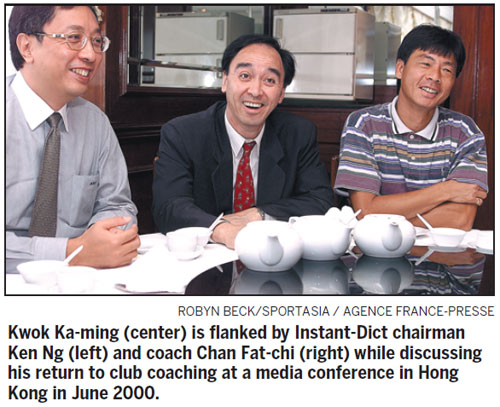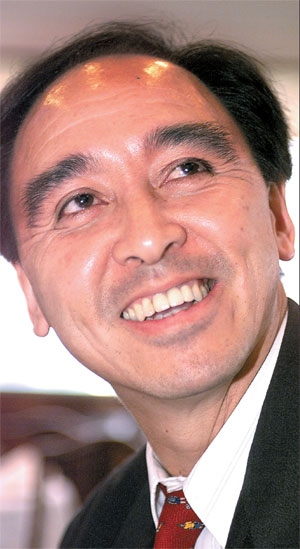From 'Dream Killer' to dream maker
Updated: 2014-06-07 07:20
By Luis Liu (China Daily)
|
|||||||||||

China's '86 World Cup nemesis trying to rebuild the game here from the ground up
Editor's Note: Soccer is the world's No 1 sport, and China has its own aims for the game. President Xi Jinping has spoken about his soccer dream: China reaching the World Cup, China hosting the Cup and, ultimately, China winning the coveted trophy.However, the nation still lags far behind in the soccer world. The 2014 Brazil World Cup is just around the corner and we have selected 11 key figures from around the country to tell us about their soccer dreams. The interviews will be on RTHK Putonghua Channel at 4pm on Sundays through June 8.
A scandal-ridden league and a laughing stock of a national team have dominated soccer talk over the past few decades.
However, even the most cynical of fans must agree that since the 2009 anti-corruption storm, the nation's soccer has been sailing in calmer waters.
The league has become increasingly competitive. With more and more big names signing on with Chinese clubs, fans are flocking back to the stadiums. And the administration has also made great strides, thanks in part to Kwok Ka-ming.
|
Renowned Hong Kong soccer coach Kwok Ka-ming was dubbed the 'Dream Killer' after he led Hong Kong to a 2-1 victory over China in a 1985 World Cup qualifier. He is now charged with lifting the game here. Robyn Beck / AFP / Sportasia |
Kwok was one of Hong Kong's most famous professional soccer players and an Asia Player of the Year winner. Now he has an even bigger role as the only Chinese member of the 21-strong FIFA Technical Study Group, the world's top soccer analyzing panel. In 2010, Kwok was also appointed by the Chinese Football Association as its technical director.
Some people regarded the move as merely a public relations stunt by the CFA as, by hiring a globally-known professional, it could enhance its image.
However, Kwok is stunned by such thoughts.
"My workload at the CFA is much heavier than what I was doing at FIFA and the Hong Kong Football Association," Kwok said. "I am here trying to help build up a system."
Kwok is mainly responsible for youth training, campus soccer, technical research and the national team's development.
Although working on such major issues, Kwok is now out of the limelight. That was not the case almost 30 years ago.
Among Chinese fans he is still regarded as the 'Dream Killer'. He was the head coach who guided Hong Kong to an upset victory over China, 2-1, in Beijing on May 19, 1985, during a 1986 World Cup qualifier.
The defeat was so unforgettable that even today "519" remains a symbol of Chinese soccer failure.
"We were an ant and we toppled the elephant," Kwok said.
China was confident of qualifying for the 1986 Mexico World Cup as the national team had finished runner-up in the Asian Cup in 1984.
At that time, Hong Kong was regarded as a "weak team". Even Kwok said those words. Every year there was a traditional friendly between Hong Kong and Guangdong, and the latter won most of those encounters.
"Even a provincial team could defeat us, no one favored us in that game (against China)," Kwok said.
"I settled on a strategy in which I hoped to make use of the opponent's optimism, focus on defense and give only about 20 minutes of strong attacking play," Kwok said. "I said I wanted to win although everybody looked down upon us."
The strategy proved to be effective. Hong Kong scored an early goal and China began to panic. Kwok would have preferred a later goal for fear of sparking his opponent's into action.
But, his team struck the decisive goal in the second half after China had tied the game. The crowd fell into a deafening silence. No one was prepared for such a result. But, soon that silence simmered into anger as disappointed fans at the Beijing Workers' Stadium went on a rampage after the game.
That single game had a huge impact. Head coach Zeng Xuelin was sent on his way and the team published an official apology in a national newspaper. And a national TV series was produced to reveal just what happened before and after that fateful game.
"I was not happy," Kwok said. "If I was not playing against China, I would definitely sit in front of the TV and cheer for China.
"But on the pitch we can't allow any unprofessional thoughts," Kwok said firmly, "otherwise it will be a humiliation of the soccer world."
While harboring no regrets, Kwok said he still wanted China to qualify for the 1986 World Cup.
"I am proud of what I did in that game," Kwok said. "But at the same time, I was, am, and will always be a supporter of China. That's the dilemma."

Now the former 'enemy' is helping the game advance in China.
After four years in his post, he believes he has found the root cause for China's soccer malaise.
"I never fear telling the truth. Technically, the biggest reason for China lagging behind is the general level of coaches." Kwok said.
"A 1 1/2-hour quality practice in Europe is the equivalent to about a day's work in China," Kwok said. "That basically means we are putting in twice the effort for half the results.
"Also, many Chinese coaches react badly during the games. And after losses they don't know how to manage the team psychologically. They tend to let the players spend more time on the training pitch, which puts the team in a vicious cycle," Kwok said.
Thus being "the coaches' coach", Kwok thinks it is his mission to address the issue head-on. "Building up a coach training system is like constructing the foundation for a skyscraper," he said. "If the base is not solid, we can expect nothing from the building even if the floors are made from the best materials."
Before Kwok took charge, the CFA had 20 official coach training courses. That number has now ballooned to more than 100. "These graduates will go back to the players with a better understanding of the sport, and that will benefit the nation's soccer so much," Kwok said, "at least we won't make basic mistakes."
Kwok openly criticized the then China top soccer official, Wei Di, as a "layman", because he vowed to copy the aquatic sports team's success. (Wei was the leader of China's aquatic sports team before taking on the premier soccer role). "For some sports, four to five years of hard work may earn you success. But soccer is different, it needs a much longer period," Kwok said.
Now China's top soccer official, Zhang Jian, is a legal expert and his boss, vice-director of the General Administration of Sport, Cai Zhenhua, was a table tennis star. The CFA remains a layman-led organization, according to Kwok.
He says Japanese soccer is leading Asia thanks to a long-term plan drawn up by the Japan Football Association.
"They made an announcement in 2005 that the national team would be in the world's top 10 by 2015. Then, in 2050, Japan would host the World Cup and try to win the trophy," said Kwok. "They are heading in that direction."
The Japanese team regularly advances to the Cup final 16.
Asked why China has not instituted such a long-term plan, Kwok said with a wry smile: "Maybe because the leaders can't wait that long.
"China's soccer will get back on track only after the leaders stop thinking about their political aspirations and administrative records," he said.
Q&A
Why did you accept the offer to sort out the Chinese soccer mess?
I don't think Chinese soccer is a mess. Now the leagues are very competitive. Guangzhou Evergrande, the nation's top team, won the Asian Champions League and reached the semifinals of the FIFA Club World Cup. That has given us a huge confidence boost. With more than 1.3 billion people, China has big resources of talent. Enhancing the youth training system is the way to exploit our full potential.
Why are Japan and South Korea leading the way in Asia?
First, their high-level officials are retired soccer players, many were national team players and some were former coaches. To be simple and straight: No laymen. Second, Japan and Korea rely on their campus soccer system. Thus the players are more educated. And later, when they join the administration, they make the right decisions. Third, the coaches train their players properly.
Which teams do you think can win the World Cup?
If the luck goes the way of the South Americans, the winner may be Brazil, Argentina or Uruguay. If it goes to European teams, I think Spain and Germany have the best chances.
luisliu@chinadailyhk.com

(China Daily 06/07/2014 page16)
Today's Top News
Vets flock to Normandy to remember D-Day
G7 'deeply concerned' about S China Sea tensions
Ukraine tightens control on border
Silk Road offers Sino-Arab blueprint
Clinton 'loves to see' female leader
US says to work with Egypt's president-elect
Oversight of military firms on rise in China
Abbott aiming to mend ties with Jakarta
Hot Topics
Lunar probe , China growth forecasts, Emission rules get tougher, China seen through 'colored lens', International board,
Editor's Picks

|

|

|

|

|

|






